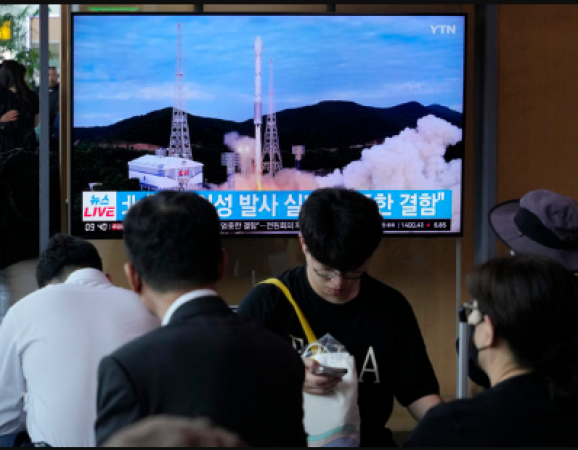
Seoul: Top State media reported on Monday that North Korean officials vowed to push for a second spy satellite launch after calling their nation's first, unsuccessful launch last month "the most serious" omission this year and harshly criticising those responsible.
A setback to North Korean leader Kim Jong Un's efforts to acquire a space-based surveillance system to better monitor the United States and South Korea came in late May when a North Korean rocket carrying a military reconnaissance satellite crashed shortly after takeoff.
Kim and other top officials attended a three-day ruling party meeting that ended on Sunday. During that time, there was extensive discussion about the failed launch and North Korea's efforts to modernise its arsenal of weapons.
Also Read: Russia: By year's end, a regional free trade agreement with Iran is possible
Who spoke at the meeting was not made clear in a lengthy report by the Korean Central News Agency, but it was stated that the report "bitterly criticised the officials who irresponsibly conducted the preparations for (the) satellite launch."
According to KCNA, the report outlined tasks for officials and scientists to complete in order to learn from the failed launch, determine what caused the rocket to crash, and conduct a successful launch in a short amount of time.
When exactly North Korea might try a second launch was not specified. However, the spy agency of South Korea had earlier informed lawmakers that it would probably take North Korea "more than several weeks" to figure out what went wrong with the failed launch.
Monitoring organisations for North Korea haven't heard of any firings or purges of scientists or others connected to the failed launch. Although he orchestrated a number of high-profile executions or purges of top officials to strengthen his grip on power in the early stages of his rule, observers claim Kim has treated scientists and technicians working in the nation's weapons development programme well.
In order to counter what he claims is US-led hostility, Kim has publicly pledged to acquire a number of high-tech military assets, including spy satellites. Kim also desires a nuclear submarine, a solid-propellant intercontinental ballistic missile, a hypersonic missile, and a missile with multiple warheads.
More than 100 missile tests have been conducted by North Korea since the beginning of 2022, some of which were related to the creation of spy satellites and other potent weapons on Kim's wish list.
North Korea conducted its first intercontinental ballistic missile test with solid fuel in April. Such missiles are more mobile than liquid-fueled rockets and are more difficult for outsiders to detect before launch because the fuel is already loaded inside of them.
Members of the Politburo asserted "big strides" in efforts to increase North Korea's arsenal of nuclear weapons and missiles during the party meeting, which they said supported the administration's strategy of maintaining "frontal confrontation" against its adversaries, according to KCNA.
The report also stated that the Politburo members examined the "extremely deteriorating security situation" in the area brought on by the "reckless war moves" of its rivals, which is apparently a reference to the increased US-South Korea military exercises. They were reported to have unanimously approved vague plans for retaliation.
In response to North Korea's growing nuclear arsenal, the United States and South Korea have increased their military exercises and have issued warnings that any use of nuclear weapons would lead to the overthrow of the Kim Jong Un regime.
The North Korean Politburo members assigned vague "important tasks" for defending national interests and bolstering ties with nations that are "opposed to the US brigandish strategy for world supremacy," according to KCNA.
In response to the conflict in Ukraine, North Korea has pushed for improved ties with Russia. It holds the United States responsible for the crisis and charges it with pursuing a "hegemonic policy," claiming that Russia had every right to defend itself by using force in Ukraine.
Along with the United States, China is North Korea's main ally and source of economic support. China and the US are engaged in a heated strategic competition over trade, technology, and regional influence.
Attempts by the US and others to impose tougher UN sanctions on North Korea because of its missile tests have repeatedly been thwarted by Russia and China, both of which are permanent members of the UN Security Council and each of which has a veto.
The party meeting also covered efforts being made at the federal level to boost North Korea's faltering economy, which analysts say has been made worse by border closures resulting from the pandemic.
Also Read: A fire breaks out on a Philippine ferry carrying 120 passengers while it is at sea
Even though it acknowledged vague shortcomings, KCNA claimed that efforts to boost agricultural output and revive the metal and chemical industries had made some progress. A project to build tens of thousands of new homes in the capital, Pyongyang, was cited by KCNA as evidence of progress in the construction industry.
The claims made by the North, one of the world's most secretive nations, are essentially impossible to confirm. Despite the hardships brought on by the pandemic, experts claim that there are no signs of social unrest or a famine in North Korea, and Kim still has complete control over his 26 million subjects.